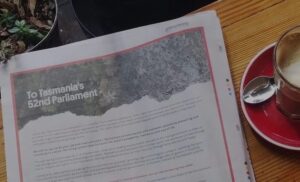The Tasmanian salmon industry’s talk about boosting the economy does not include paying tax
The Tasmanian salmon industry talks a big game about its importance to the economy, but it is rather quiet when it comes to paying tax
The Tasmanian salmon industry never misses an opportunity to claim that it is economically important for the state. But for an industry claiming to bring in the big bucks, one word is rarely mentioned – tax. The reason is simple – the big three salmon companies don’t pay much.
The industry is dominated by Tassal, Huon Aquaculture and Sealord Australia. Between them they reported $7,023 million in income and paid just $51 million in tax between 2013-14 and 2020-21.
Note that not all companies were covered by the ATO data in all years, see our report for details.
Across the 9 years from 2013-14 to 2021-22 the total tax paid by the three major Tasmanian companies equaled just 8.8% of their taxable income and a truly pathetic 0.7% of their total income
The only Tasmanian salmon company to report company tax payments in the last three data years has been Sealord. However, our analysis suggests that these payments are likely based not on its salmon farming, but on other parts of its diversified seafood business.
It is likely, therefore, that the Tasmanian salmon industry paid zero company tax in 2019-20, 2020-21 and 2021-22.
Future ATO data releases may not include data for the Tasmanian salmon producers as they are now all owned by foreign multinationals, and may not be required to report this data. This latest data release could be the last time the public can see how little benefit they receive from this industry, which has significant environmental impacts.
Related research
Between the Lines Newsletter
The biggest stories and the best analysis from the team at the Australia Institute, delivered to your inbox every fortnight.
You might also like
Are Australians eating diseased salmon? Sickening new revelations from Tasmania
Shocking new revelations about Tasmanian salmon should leave all Australians feeling sick to the stomach.
Open Letter to the Tasmanian Government
The Australia Institute and 30 other organisations from around Tasmania have published an open letter with 10 asks for the environment from whomever forms Tasmania’s next government. When cross-benchers and major parties have struck successful power-sharing agreements elsewhere, they covered policy as well as procedure, making now the ideal time for progress.
Secrecy, Prime Ministerial promises, now mass deaths – time to clean up Tasmania’s salmon industry
Australia’s Administrative Review Tribunal has ordered the federal government to release a ministerial brief on the prospective extinction of the Maugean skate, recognised for its World Heritage value, in a win for government transparency over a culture of secrecy.


